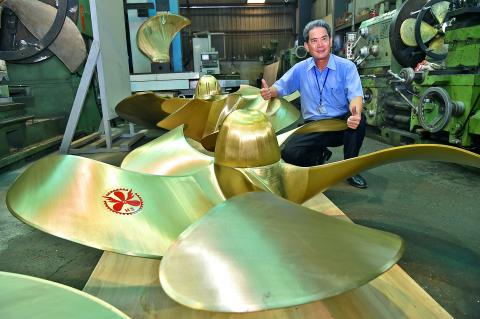Taiwan’s largest shipbuilding company called on the nation’s three major shipbuilders to set aside their differences and band together to achieve the goal set by the administration of President Tsai Ing-wen (蔡英文) of building submarines.
The Tsai administration has highlighted domestically produced submarines and training aircraft as staples of its national defense policies, with the stated goal of operating a self-built submarine by 2025.
Taiwan Shipbuilding Corp chairman Lai Sun-quae (賴杉桂) said completing such an objective would be a difficult and complex process that would require every ounce of expertise Taiwan has to offer, as well as some foreign support.

Photo: Chang Chung-i, Taipei Times
Despite being competitors and having some bad blood between them, the nation’s shipbuilders should put aside their differences, as indigenous submarines are a national goal, Lai said.
The Taiwan Shipbuilding Industry Association on Friday hosted an event for companies to display the fruits of their research, with Taiwan Shipbuilding, Jong Shyn Shipbuilding and Ching Fu Shipbuilding providing demonstrations.
Taiwan Shipbuilding displayed sections of its own prototype submarine, including the torpedo room and the front end, and announced where it would base its manufacturing operations for the project should it be awarded the contract.
The company said the details of the submarine’s construction would not be publicized for fear of compromising confidential information.
Ching Fu said it would display a finished prototype for a submarine control system capable of integrating 90 other systems at the Kaohsiung International Maritime and Defense Expo in September.
China Steel Corp said it plans to replace HY-80 steel with a new type known as HSLA-80, which is to be examined by the Ship and Ocean Industries Research and Development Center in the second half of this year.
China Steel added that it would use HSLA-80 in military ships currently under construction on a trial basis.
Meanwhile, the Ministry of National Defense said it would divide the indigenous submarine project into contractual design and construction, which companies would bid on.
However, Taiwan Shipbuilding, the firm most likely to be awarded the project, suggested that the contract be awarded as one project to avoid mistakes and cut down on the ministry’s expenses, sources said.
By awarding the contract to one company, that firm would be able to manage and cooperate with other companies, foreign or domestic, Lai said, adding that, contrary to popular belief, lump sum projects do not cause the company that wins the bid to monopolize resources.

Chinese Nationalist Party (KMT) Chairman Eric Chu (朱立倫), spokeswoman Yang Chih-yu (楊智伃) and Legislator Hsieh Lung-chieh (謝龍介) would be summoned by police for questioning for leading an illegal assembly on Thursday evening last week, Minister of the Interior Liu Shyh-fang (劉世芳) said today. The three KMT officials led an assembly outside the Taipei City Prosecutors’ Office, a restricted area where public assembly is not allowed, protesting the questioning of several KMT staff and searches of KMT headquarters and offices in a recall petition forgery case. Chu, Yang and Hsieh are all suspected of contravening the Assembly and Parade Act (集會遊行法) by holding

PRAISE: Japanese visitor Takashi Kubota said the Taiwanese temple architecture images showcased in the AI Art Gallery were the most impressive displays he saw Taiwan does not have an official pavilion at the World Expo in Osaka, Japan, because of its diplomatic predicament, but the government-backed Tech World pavilion is drawing interest with its unique recreations of works by Taiwanese artists. The pavilion features an artificial intelligence (AI)-based art gallery showcasing works of famous Taiwanese artists from the Japanese colonial period using innovative technologies. Among its main simulated displays are Eastern gouache paintings by Chen Chin (陳進), Lin Yu-shan (林玉山) and Kuo Hsueh-hu (郭雪湖), who were the three young Taiwanese painters selected for the East Asian Painting exhibition in 1927. Gouache is a water-based

Taiwan would welcome the return of Honduras as a diplomatic ally if its next president decides to make such a move, Minister of Foreign Affairs Lin Chia-lung (林佳龍) said yesterday. “Of course, we would welcome Honduras if they want to restore diplomatic ties with Taiwan after their elections,” Lin said at a meeting of the legislature’s Foreign Affairs and National Defense Committee, when asked to comment on statements made by two of the three Honduran presidential candidates during the presidential campaign in the Central American country. Taiwan is paying close attention to the region as a whole in the wake of a

OFF-TARGET: More than 30,000 participants were expected to take part in the Games next month, but only 6,550 foreign and 19,400 Taiwanese athletes have registered Taipei city councilors yesterday blasted the organizers of next month’s World Masters Games over sudden timetable and venue changes, which they said have caused thousands of participants to back out of the international sporting event, among other organizational issues. They also cited visa delays and political interference by China as reasons many foreign athletes are requesting refunds for the event, to be held from May 17 to 30. Jointly organized by the Taipei and New Taipei City governments, the games have been rocked by numerous controversies since preparations began in 2020. Taipei City Councilor Lin Yen-feng (林延鳳) said yesterday that new measures by